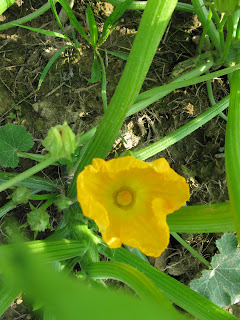Those of you who follow the blogs of artist and writer, Jackie Morris, may already have read her tribute to her Kiffer Cat who so quietly died this morning. Reading of Kiffer's early perilous life before he was rescued by Jackie, has put me in mind of a strange feral cat who visited our Vermont home for several years.
We met Old Hopper as he came to be called, through the noise he was making outside our small log house in Vermont. Working in the kitchen late on a grey and cheerless winter afternoon I heard a series of thumps and scrapes drifting up toward the kitchen window from the area near the basement door.
Going down, I encountered the sight of a cat's striped rear view and shoulders. His head was thrust inside an empty tin can which he had rootled from the garbage bin. He lurched forward, bumping into various obstacles, reeled backwards in a crazy attempt to free himself from the can. I managed to get within reach as he bumbled about and in one quick wrench freed his head from the tin. Slightly dazed, he glared at me as though I had been the cause of his dilema, rather than his rescuer. Then he scuttled toward the bottom of the garden. As he hobbled away, I saw that one back leg was only a stump--the paw missing.
I didn't want him there. He was a tomcat, he was wild. He had surely never been vaccinated. But--it was cold, he was certainly hungry, and it didn't appear that anyone else wanted him either.
Resignedly I found an old shallow pan, put in a cupful of kibble with what I hoped might be an appealing assortment of leftovers and placed the pan near where he had been raiding the garbage bin.
Nearly every day that winter we saw him. He approached the house with his hobbling gait, peering anxiously about. If I opened the door or window he retreated. As the winter advanced his retreats became less hasty. He limped to the edge of the frozen vegetable patch, humped himself around to face me, squatting in the snow. His eyes were wary, his thin body tense, but sometimes he allowed himself a tentative meow. Once in a great while, if I inched toward him while he was eating I could lay a cautious hand on his back.
With the coming of summer Old Hopper's visits were less frequent. We saw him sometimes crouched in the rough grass of the pasture or at the edge of the meadow. We assumed his hunting must be productive.
When the days grew short and cold, again he accepted the offerings put out in the battered pan.
During the second or third summer of our acquaintence with him, Old Hopper began to stay closer to the house and garden. We were outside a good deal, working in the garden, taking tea on the porch, strolling around the yard. Old Hopper would venture cautiously near, twitch and glare, mew in his rusty voice, back away, then inch forward again. We had the impression he would prefer that we go inside--away--leave him the yard and the porch to enjoy in solitude.
"We're not going," I told him firmly. "We were here first."
If I was alone and carried a book outside to read, Old Hopper began creeping forward to take advantage of the shady spot beneath my chair. He could never relax, was always alert to spring away. Cautiously I began to reach toward him at such times, lightly stroking his bony spine, patting his head. Sometimes a croaking purr rumbled from his throat, sometimes he raised his head almost eagerly to my trailing fingers. Sometimes, perhaps overcome by his own termerity in accepting human affections, he would suddenly growl, hiss and run for the edge of the porch, where he would huddle, staring at me in a wild manner, before creeping slowly closer again, almost as if he recognized his own lack of social graces.
I never attempted to pick him up. To do so would have frightened him horribly and I knew he would struggle and claw. He seemed to be resigned that during warm weather he had to share the dooryard and the gardens with the humans who kept his dish supplied with food.
Through that summer and autumn Old Hopper followed his pattern of short-term disappearances and frequent visits.
As cold weather came on perhaps he was relieved that he had the yard and the garden and the woodpile to himself more often.
Sometime mid-winter I realized that it had been nearly a week since we had seen him. Days were short and bleakly cold, nights were long and frigid. As the weeks wore on, I suspected that we had seen the last of Old Hopper. His dish was untouched, his unique footprints no longer marked the snow at the back door.
Feral cats don't live long, harried as they may be by dogs, foxes, other territorial cats, or by humans who won't tolerate their skulking presence.
We couldn't invite him in, but we could feed him. We never knew his story--where he came from, how his life ended. I remember his uneven gait, adapted to his three and a half legs, his precipitous arrival and his desparate maneuvers with the empty tin. I remember that, however reluctantly, he was finally able to accept my touch--in exchange for a meal.
Drawing a line in time: Earth, ashes and song The story of Jackie's Kiffer Cat is here, with a eulogy for him at the ginger cats' blog here.
http://wethreecats.blogspot.com/2010/06/thanks.html


















































